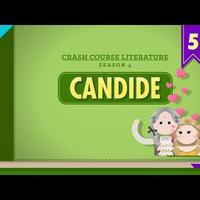Candide: Crash Course Literature 405 - YouTube (2)
Like we should stop worrying about everyone else's garden.
And I guess that seems sensible enough.
A lot of people would probably feel better if instead of worrying themselves sick about
the problem of evil in their lives, and in other people's lives, they just grew some
tomatoes and worked on their embroidery.
But as a conclusion to this particular novel, it does seem weirdly conservative?
I mean, the ending is a return to a garden.
What's more Biblical than that?
And there's also this selfishness to that choice.
Our garden.
I mean there is a huge earthquake in the novel, but most of the suffering is inflicted not
by a higher power but by humans upon one another.
These humans rape and kill and disembowel each other, and growing tomatoes may be a
way of personally opting out of those social problems, but I'm not convinced it does
much to fix them.
I guess Voltaire thinks those problems are unfixable, and that people will be evil no
matter what, but should we succumb to that pessimism or should we try to work to change
and improve this not-yet-best-of-all-possible-worlds?
Is it enough to tend your own garden, or do we have a responsibility to help our neighbors
tend their gardens as well?
I don't know.
But, I do think we should at least share our vegetables.
Thanks for watching.
We'll see you next time.

